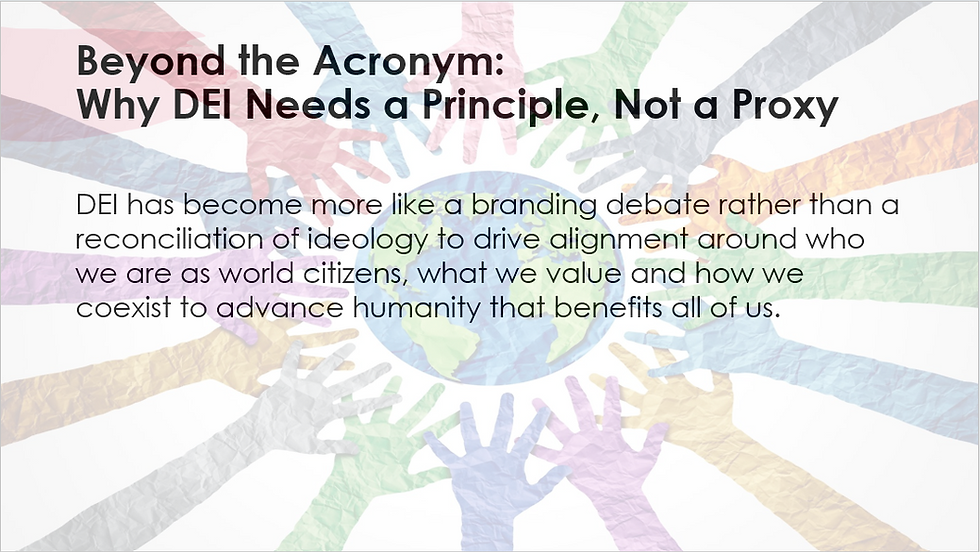DEI: Stop Arguing Over the Acronym. Start Debating the Principle.
- srjosephlawfirm
- Jul 23, 2025
- 2 min read
The current backlash around DEI - diversity, equity, and inclusion - has become less about what it means and more about what the acronym represents in an increasingly polarized climate. More often than not, the acronym becomes a lightning rod and utilized as a proxy in political and cultural power struggles.
But here’s the truth: the real issue is not the letters. It’s the principle. And that principle remains unsettled.
What exactly are we debating?
Is this a racial justice principle, aiming to address historical inequities and level the playing field for access to opportunity?
Is it a gender-focused mandate to rectify long-standing disparities in pay, representation, and power?
Is it about identity in all its forms including race, gender, age, national origin, ability, sexual orientation, religion, and more?
Or is it something broader - a civil rights principle, where government and institutions play a key role in protecting people from bias and discrimination?
Or perhaps it’s even more foundational - a human-centered framework, grounded in a moral responsibility to honor the dignity and freedom of everyone, regardless of difference?
Or, is it a hybrid of one or more of the above?
For those of us who are doing the work, going into organizations and seeking to understand where leadership wants to go with their organizational journey. Here’s the persistent question that keeps resurfacing beneath the surface of just about every DEI strategy: What ideology are we actually asking people to rally around? Until that question is answered with clarity and consensus, DEI will continue to provoke confusion, controversy and likely, resistance. And it’s not necessarily because people reject fairness, but because they don’t agree on what it stands for.
That’s because we’ve allowed DEI to become a branding debate, seemingly beholden to an acronym that oftentimes distracts from substance. In its current form, DEI is serving in counterproductive ways: intensifying polarization and hindering alignment, instead of building bridges or driving agreement on common ground. That’s what the data-driven methodology reveals from my teams’ approach across multiple industries in the public and private sectors and across for-profit and non-profit organizations over the last 5 years.
The lack of shared understanding around the guiding principle, and the ideology behind it, has created more division than progress.
Until we’re willing to do the harder work of naming and aligning on what we’re actually trying to uphold, protect, or advance, no acronym will survive scrutiny. No strategy will withstand resistance. And no initiative will earn enduring trust.
DEI is not the problem. But it’s become the arena where deeper and unresolved societal tensions are playing out about who we are, what we value, and how we coexist.
Let’s stop reducing complex human realities to an acronym war. Instead, let’s start doing the real work: defining the principle and clarifying the ideology.
Until we do, we’re not solving anything. We’re just fighting over letters. But we don’t have to abandon the acronym - we just don’t have to lead with it. Let’s lead by defining the problem, which is not the acronym. #DEI #Diversity #Equity #Inclusion #Ideology #Impact #ValueProposition #DataDrivenInsights #ProblemSolving #GuidingPrinciples #CoreValues #NavigatingAmbiguity #NorthStar #MeasurableOutcomes




Comments